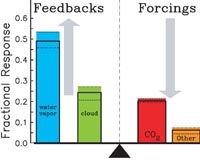| . |  |
. |
Canberra, Australia (SPX) Oct 18, 2010 The authors of a new book have called for the development of more robust international ocean and ice sheet monitoring and modelling programs designed to help community adaptation planning keep pace with the threat of rising sea levels. "The good news is that a recent concentration of science resources is improving our insight into ocean and ice dynamics, and scientific measurement of the rate of sea-level rise," says the book's lead editor, CSIRO Fellow and oceanographer Dr John Church. "The way the world responds to climate change will become increasingly reliant on a sophisticated integrated atmosphere, ocean and ice observing network generating data on future climates and from which global and regional sea-level rise can be projected. "The key question is where and how sea-level rise and associated extreme events will have their impact," Dr Church says. The 420-page book: Understanding Sea-level Rise and Variability, is the work of more than 90 scientists from 13 nations, led by Dr Church, Dr Philip Woodworth from the Proudman Oceanographic Laboratory UK, Dr Thorkild Aarup from the Intergovernmental Oceanographic Commission (IOC), and Dr Stan Wilson from the US National Oceanic and Atmospheric Administration. It provides a comprehensive overview of current knowledge on the science of sea-level rise, identifies the major impacts, assesses past sea-level change and the factors contributing to sea-level rise, and assesses how extreme events at the coast will change. The book will be detailed this week at the Australia-New Zealand Climate Forum, being held in Hobart from October 13-15. Dr Church says coastal development has accelerated over the past 50 years. Many of the world's megacities are situated at the coast and new infrastructure worth billions of dollars is being constructed. These developments assume that the stable sea levels of the past several millennia will continue. This assumption is no longer true. "Populations in low lying islands and deltaic regions are particularly at risk. "Our knowledge has improved significantly since satellites were launched to observe the ocean and the ice sheets and robots deployed to explore the oceans. However, there are critical gaps in observations of the deep ocean, glaciers and ice sheets. "Paralleling this, the development of computer simulations projecting ocean and ice sheet dynamics will be the tools that science needs, governments will rely on and coastal communities from the Pacific islands to the river deltas of Asia will be demanding. "We cannot ignore sea-level change because it has the potential to change forever the crowded coastal fringes of our continents," Dr Church says. The book was initiated by the World Climate Research Programme and IOC shortly after Hurricane Katrina in 2005, but before cyclones Sidr and Nargis in 2007 and 2008. All claimed thousands of lives.
Share This Article With Planet Earth
Related Links CSIRO Marine and Atmospheric Research Climate Change Climate Science News - Modeling, Mitigation Adaptation
 Carbon Dioxide Controls Earth Temperature
Carbon Dioxide Controls Earth TemperatureGreenbelt MD (SPX) Oct 15, 2010 Water vapor and clouds are the major contributors to Earth's greenhouse effect, but a new atmosphere-ocean climate modeling study shows that the planet's temperature ultimately depends on the atmospheric level of carbon dioxide. The study, conducted by Andrew Lacis and colleagues at NASA's Goddard Institute for Space Studies (GISS) in New York, examined the nature of Earth's greenhouse eff ... read more |
|
| The content herein, unless otherwise known to be public domain, are Copyright 1995-2010 - SpaceDaily. AFP and UPI Wire Stories are copyright Agence France-Presse and United Press International. ESA Portal Reports are copyright European Space Agency. All NASA sourced material is public domain. Additional copyrights may apply in whole or part to other bona fide parties. Advertising does not imply endorsement,agreement or approval of any opinions, statements or information provided by SpaceDaily on any Web page published or hosted by SpaceDaily. Privacy Statement |